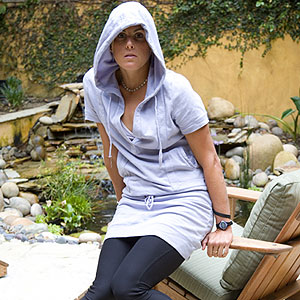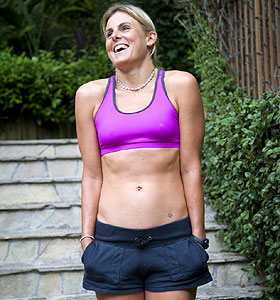Biscay revises, extends comments

Professional triathlete Hillary Biscay made some news on her blog last week when she announced her departure from Team TBB and coach Brett Sutton. Not just Hillary, but teammates Chrissie Welligton and Belinda Granger are on the move relocating to Tucson for part of the year. They'll be coached by Cliff English, the former USA Triathlon national team coach who also coaches Samantha McGlone.
It's fair to say Ms. Biscay was bewildered and a bit irritated by the reaction to her blog installment, as if what she wrote was a digital version of a semi-private diary, rather than news that would be found and and broadcasted by the greater triathlon media. Welcome to the internet.
In this interview we endeavored to round out her blog comments, and also uncover a bit more about this swimmer-turned-triathlete. Both photos are courtesy of Brooklin Pictures.
Slowtwitch: You're quite intelligent, as it happens, and I think most people would be shocked to discover your scholastic background. Do you think I'm right that they would be shocked?
Biscay: [Laughs] Does that mean I come off as a dumb ass?
Slowtwitch: Do you think you try to keep the brainiac side to you a secret? Is it antithetical to a professional triathlon lifestyle?
Biscay: Definitely not. I don't intentionally try to hide that. But I think that perhaps my Southern California slang, my Aussie slang, obscures that.
Slowtwitch: Let me put it another way. You were working on a PhD in American Literature. How many people in your tri circle know your favorite books, or authors or what you're now reading?
Biscay: Not many. I am definitely met with a blank stare or question mark, so I usually don't bring it up unless questioned.
Slowtwitch: I think my point is taken. Okay, what ARE your favorite authors?
Biscay: My favorite, Toni Morrison. I did my undergrad honors thesis on Toni Morrison. I chose all my university courses on Beloved, and must have read it twenty times.
Slowtwitch: Can you think of another famous person who lists Morrison, and this book, as among his favorites?
Biscay: No! Who?
Slowtwitch: Barack Obama.
Biscay: Oh really! Yet another reason!
Slowtwitch: What is it you like about this sport, and I want the literary, scholarly side of your brain to fashion the answer.
Biscay: Oh, my gosh! Much easier to come up with literary, scholarly replies in writing rather than off-the-cuff. I think that what attracted to me to this sport at first, and still, are the contrasting elements between this and competitive swimming. I devoted 15 years of my life to that, all the way to the Olympic Trials in 2000. The last 3 years were given to lots of disappointments — of my own making. Performance anxiety issues. Couldn't get out of my own way. Couldn't get it all together. Something about everything being compressed to two-and-a-half minutes in the pool. Despite all the work I put in I had absolutely no control what would happen. There was that issue. I wanted so so so badly to be good. I was good, but on my team, on USC, I swam with a bunch of gold medalists. So, I was nothing by comparison. I wanted it so bad, I was my own undoing. Plus, natural ability plays a huge role, and I was pretty well aware that was something I didn't have, everything was accomplished by grinding it out.
Ironman, there's a much better correlation between the work you do and how you perform on race day. Come hour-six, or seven thru ten, it's about the work you put in. I'm not afraid to put in the hard yards.
Slowtwitch: You have an extremely full training and racing life. No time for scholarly pursuits. Nevertheless, will you find time to earn your doctoral degree yet in American Literature, and if not then what?
Biscay: I think I'm welcome back at USC to finish my PhD. But right now I'm 30, I think I can race for 8 or 10 more years. If I am fortunate enough to make a career in this sport after racing, that's what I'd like to do. Of course I might by that time get tired with it. But as for now I love doing it, I love watching it, I coach several athletes, that's my passion. So, this might be my [post retirement] gig.

Slowtwitch: What are you doing, or what would you like to do, to keep your foot in the door, or brain in the door, of literary scholarship?
Biscay: Yeah, I think if we're talking about academic or scholarly pursuits, if I don't go back to school it probably would be a hobby. One of my best friends is on faculty at USC, we talk about having our own book club, but that's not happened. You need that kind of stimulation. This is hardly scholarly, but I still enjoy writing blogs and for magazines.
Slowtwitch: Okay, I worked on your bike position this Summer, I note that you tended to have better bike rides and were better placed off the bike in the later-season races. Did we do you any good?
Biscay: I felt like I had a massive breakthrough with my riding. One of Brett's goals for me for the year was to get some experience leading off the bike. I was feeling pretty terrible on the bike, no power. So I came to you.
Then you and John Cobb staged an "intervention" about my cadence, that I ride above 65rpm. We did the work on the fit bike. I worked on the higher cadence, and the correlation between watts and cadence. So, yeah, I went home and rode the new position, tried to ride the new cadence, and straightaway at Ironman Brazil I had the fastest bike split, first time that's happened, led off the bike by 9 or 10 minutes. Then I was first off in Placid, first off in Wisconsin, where I finally won the bloody thing.
Slowtwitch: Personally, I think we got about halfway to the goal. I think there were some equipment issues that limited the comfort available to you even in the perfect position. Let's talk equipment. What are your keepers for the 09 season, and what's up for grabs?
Biscay: I am definitely sticking with my ISM Adamo saddles. I've been on them for two-and-a-half years, I love it. Won't be changing that. I will be sticking with my Oakleys.
Slowtwitch: Bikes, aerobars?
Biscay: All my contracts are up for renewal.
Slowtwitch: Let's talk about coaching for a moment. Coaching and racing. First, do you consider yourself coachable?
Biscay: [Laughs] I didn't until I went to Sutto. I had been very resistant to any kind of structure prior to that, because of the regimented structure of swimming. I finally realized that this is my job. If I wanted to be successful, I do believe that if you are going to invest in a coach, I think you have to be all in. You have to decide. The point of having a coach is to take that stress of having to coach yourself and give that up, be willing to follow the program 100 percent, and it worked, so I think that now I am coachable.
Slowtwitch: Over the last couple of years, you've been averaging eight Ironmans a year. Let us say that a coach limited you to three a year. Would you be able to stick to that?
Biscay: Aarrgh! That is a fantastic question. I'm having a meeting with Cliff English, and I'm afraid he's going to bust out with that. That's a great question. I'll be able to answer after I have that meeting.
Slowtwitch: Why are you moving over to a new coach? Is it all about coaching? Or is it all about freedom? Or is it about equipment selection? Money and sponsorship? Or do you think Brett just lost faith in your ability?
Biscay: It is largely an issue of sponsorship, because the structure of Team TBB is designed for what Brett would call developmental athletes. Over the past couple of years I've worked very hard to get just not race results but to perform the duties I have to perform for sponsorship. It's now beyond what the team is built for. And to some degree I think Brett feels his work with me is done. We established a 3-year plan. I think he'd be the first to say we exceeded our ambitions. So yeah, I've exceeded expectations, we've completed the project, and he wants to move onto other things as well.

